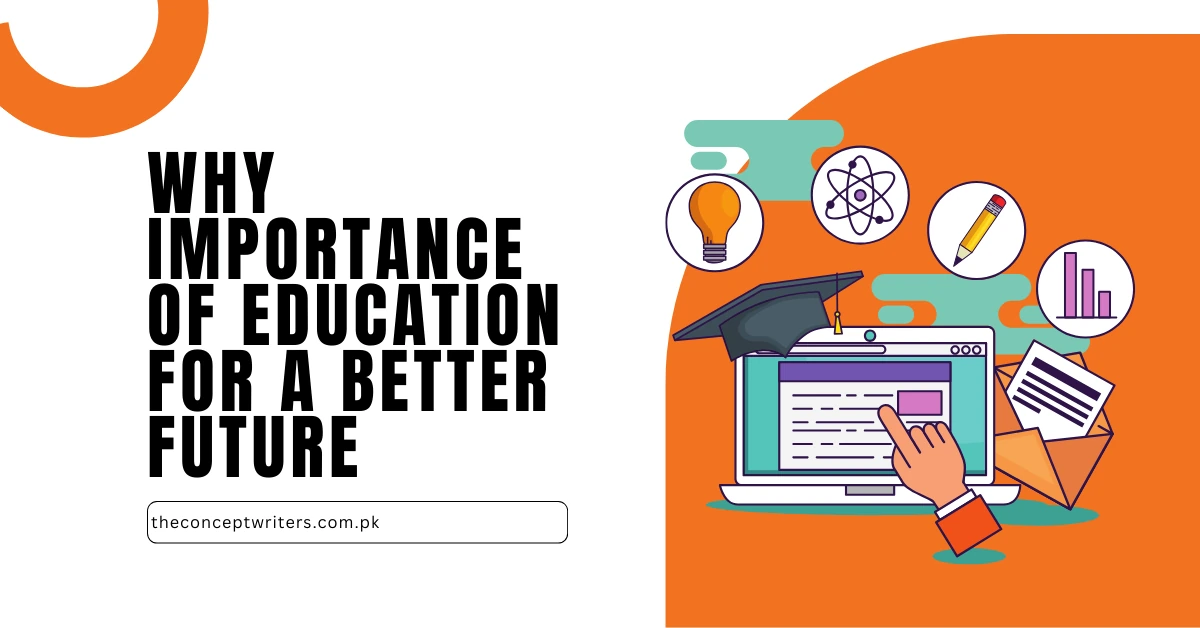Importance of Education
Education is one of the most important tools for personal and societal growth. It is a process that helps individuals acquire knowledge, skills, values, and attitudes essential for success. Education is not just limited to formal schooling but also includes various forms of learning, such as self-education, on-the-job training, and experiential learning.

The importance of education cannot be overstated. It is the foundation of all human progress and development. It empowers individuals to become productive members of society, think critically and creatively, solve problems, communicate effectively, and make informed decisions.
In this article, we will explore how education is important and how it benefits individuals, communities, and society.
Education promotes personal development.
Education is essential for personal growth and development. It provides individuals with the skills and knowledge necessary to navigate life successfully. Education allows individuals to develop critical thinking, problem-solving, and decision-making skills. These skills are essential for success in both personal and professional life.
Education also allows individuals to learn about different cultures, beliefs, and perspectives. This diversity exposure helps individuals develop empathy and understanding, which are crucial for building relationships and working effectively with others.
Moreover, education helps individuals to develop self-awareness and self-confidence. It enables individuals to identify their strengths and weaknesses and set personal growth and development goals.
Education improves employability
Education plays a crucial role in improving employability. It provides individuals with the skills and knowledge necessary to pursue their chosen career paths. Education helps individuals acquire the technical skills, practical experience, and industry-specific knowledge required for success in the job market.
Moreover, education also provides individuals with the soft skills necessary for success in the workplace, such as communication, teamwork, and problem-solving. Employers highly value these skills, and individuals with strong, soft skills are often preferred over those who lack them.
Education also opens up a wide range of career opportunities for individuals. It enables individuals to pursue careers in various fields, including healthcare, business, law, engineering, education, and many others.
Education promotes social mobility.
Education is a powerful tool for promoting social mobility. It allows individuals to break free from the constraints of their social and economic backgrounds and achieve their full potential.
Education enables individuals to acquire the skills and knowledge necessary to pursue higher education, which can lead to better-paying jobs and greater financial stability. This, in turn, can lead to improved living standards and better opportunities for themselves and their families.
Moreover, education also promotes social cohesion and reduces inequality. It helps to create a more equal and just society by providing individuals with the skills and knowledge necessary to participate fully in civic life.
Education promotes economic growth.
Education is a key driver of economic growth. It provides individuals with the skills and knowledge necessary to participate in the workforce and contribute to the economy.
Education plays a crucial role in economic growth by providing individuals with the skills and knowledge necessary to participate in the workforce and contribute to the economy. Education enables individuals to acquire the technical skills, practical experience, and industry-specific knowledge required for success in the job market. It also promotes innovation and entrepreneurship by enabling individuals to develop new ideas, products, and services that can lead to economic growth and job creation.
Moreover, education also promotes innovation and entrepreneurship. It enables individuals to develop new ideas, products, and services that can lead to economic growth and job creation.
Furthermore, education also plays a critical role in attracting foreign investment. Countries with high-quality education systems are often seen as more attractive to foreign investors, providing a skilled and educated workforce that can contribute to economic growth.
Education promotes democracy and citizenship.
Education plays a critical role in promoting democracy and citizenship. By providing individuals with the knowledge, skills, and values necessary for democratic participation, education empowers individuals to engage in civic life, participate in decision-making, and contribute to society. In this section, we will discuss how education promotes democracy and citizenship.
- Promoting civic engagement
Education promotes civic engagement by providing individuals with the knowledge and skills necessary to participate in the democratic process. It enables individuals to understand the principles of democracy, the importance of civic participation, and how they can contribute to society. Education also provides individuals with the tools necessary for effective communication, critical thinking, and problem-solving, which are essential for democratic participation.
- Encouraging informed decision-making
Education encourages informed decision-making by providing individuals with the knowledge and skills necessary to make informed decisions. It enables individuals to understand complex issues, critically evaluate information, and make informed decisions about important issues. This, in turn, enables individuals to participate in the democratic process, hold their leaders accountable, and contribute to the development of society.
- Fostering social cohesion
Education fosters social cohesion by promoting understanding, tolerance, and respect for diversity. It enables individuals to learn about different cultures, religions, and beliefs and to appreciate the differences that make society vibrant and diverse. Education also promotes social justice and equality, which is essential for a healthy democracy.
- Encouraging active citizenship
Education encourages active citizenship by promoting a sense of responsibility and accountability. It enables individuals to understand their rights and responsibilities and appreciate their actions’ impact on society. Education also provides individuals with the tools necessary to contribute to the development of society, whether through political participation, volunteering, or community service.
- Encouraging critical thinking
Education encourages critical thinking by providing individuals with the skills necessary to evaluate information critically and to think independently. This is essential for democratic participation, enabling individuals to challenge conventional wisdom, question authority, and make informed decisions about important issues. Education also enables individuals to identify and evaluate different information sources and distinguish between facts and opinions.
Conclusion
In conclusion, education is one of the most important personal and societal growth tools. It empowers individuals to become productive members of society, think critically and creatively, solve problems, communicate effectively, and make informed decisions. Education promotes personal development, improves employability, promotes social mobility, promotes economic growth, and promotes democracy and citizenship.
The importance of Education is an investment in the future of individuals, communities, and society. Providing access to high-quality education can create a more equal and just society, promote economic growth and innovation, and foster civic engagement and democratic participation. Therefore, governments, individuals, and organizations must prioritize education and provide equal opportunities for everyone to access education and achieve their full potential.



